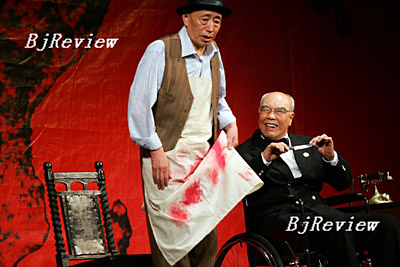
"For a long time plays have been a window for Chinese people to breathe into different cultural atmospheres," said Yu Qiuyu, a famous writer and former head of the Shanghai Theater Academy. Plays have played a remarkable role in China in the last 100 years as the harbingers of cultural fusion between Chinese and Western culture, according to Yu.
He acknowledges that movies later played a similar role, but China has imported both good and bad films, while "for plays we have imported only the strongest classics."
Chinese directors have adapted works by internationally renowned writers, such as Henrik Ibsen, William Shakespeare, Paul Mauriat, Anton Pavlovich Chekhov, Eugene O'Neill, Arthur Miller, Jean Paul Sartre, Samuel Beckett and Friedrich Dürrenmatt. Yu observed, "Even before China opened itself up on the economic front, the introduction of plays in China had already prepared people culturally for the opening up. The enlightenment people gained from watching plays explains why Chinese people later understood the world faster than the world understood China."
Of course, foreign plays have been given Chinese faces to be the voices of different social strata. The New Youth magazine, which was founded in 1915 and quickly became the most popular reform journal, dedicated a whole issue to plays by Ibsen in 1918. This inspired a generation of young playwrights in China to aspire to become the Ibsens of China.
Commenting on the skyrocketing popularity of Ibsen's plays in China, Lu Xun, arguably the greatest writer of modern China, who died in 1936, had said an important reason was that "Ibsen had the courage to attack society and attack the majority of people."
In the early 20th century, among all Ibsen's plays, A Doll's House arguably exerted the greatest influence on young people's minds. The play was debuted in China in 1914, by China's first modern dramatic society.
The heroine, Nora Helmer, who finally decides to leave her husband and children and become an independent woman, became an icon for many young Chinese women, in the context of arranged marriages.
Ibsen's second most watched drama in China is Peer Gynt, which was performed in 1983 by the graduating class of the Directing Department of the renowned Central Academy of Drama. The recreation of this classic was regarded as a climax in China's drama arts. Another version was performed by the Central Experimental Theater in 1998, who invited an actress from Norway to play Nora. The adaptation was a unique mixture of two cultures as the Norwegian actress spoke mainly in English with only a few Chinese lines, while the other actors spoke mainly in Chinese. This bilingual version was well received at the box office.
Aside from Ibsen, Shakespeare and Goethe are also familiar writers to Chinese audiences.
Beijing People's Art Theater (BPAT), the longest-standing drama group in China, has blazed its own trail in giving foreign scripts a Chinese twist. In translating, BPAT has emphasized using colloquial Chinese rather than literal translation to facilitate ordinary spectators' understanding of the plots. Watching these plays, an audience never feels that they are watching a story situated in a foreign country.
BPAT has created a series of masterpieces of this genre, including The Caine Mutiny Court Martial, adapted from a 1951 Pulitzer Prize winning novel by Herman Wouk and The Butcher. The translator of this script was Ying Ruocheng, a BPAT actor and director, who spoke perfect English. The hero in The Caine Mutiny Court Martial had to speak a long monologue. The lines of the Chinese version were so vividly translated that the monologue, more than 1,800 characters, became the most gripping part of the whole play.
Ying, who later became Vice Minister of Culture, also consolidated his position on the stage by translating several classics of Shakespeare into colloquial Chinese. Ying's most memorable leading stage role was Willy Loman in Death of a Salesman, translated by himself. Ying's interpretation of Loman, the tired but tireless salesman who would do anything for his sons, brought tears and resounding ovations from theater-goers.
BPAT's localization of foreign plays has been so successful that it has attracted a large number of followers, but imitators have struggled to reach the same level of popularity. Yan Liu, an art editor from China News Service, said it has taken several generations of hard work to reach the level BPAT is at today.
However, Yan added, "BPAT's approach is not the only correct approach to localizing foreign plays. Other drama troupes and theaters have great potential and space to open new ground."
